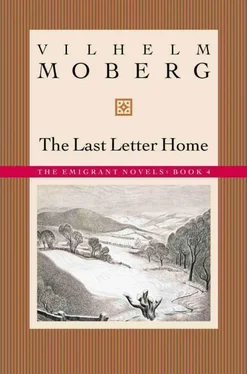XXIII. THE LETTER TO SWEDEN
Nilsson Settlement at Chisago Lake
Minnesota
July 30 1875
Beloved Sister Lydia Karlsson,
May you be well is my daily wish, I have not Written since long ago. But if these Lines find you They are from your Brother in North America.
Changes have taken place since I Last wrote. I want to tell you that last year I left my farm to my Oldest Son, you must remember Johan. He was 4 years of age when we left Sweden. Now he has taken over, the Son picks up where the Father leaves off, the other children are still at home except Harald who has gone to St. Paul to work for the railroad and Frank who Sits in the Timber company’s offis in Stillwater.
I am not yet old in Years but worn from wear. And I have broken enough land in America. I work a little every day and do what chores I can, if I don’t work my bowels won’t move. I am in good circumstances and need not worry about Daily Bread. Everything has gone up after the closing of the War. Money situation is now orderly. Our Farm gives plenty of Crops and we sell our Wheat at high Prices.
Glad you like the Portrait of the House. I have had taken a portrait of myself which I enclose. Not much to Look at, the Years show their wrinkles. And our bodies go downhill when we near old Age. Have you started to use Glasses for the eyes? Is your hair graying?
I wonder if Brother and Sister would recognize each other after all the years gone by?
My thoughts often wander to the Place where I was born and where my kind Parents helped me grow up. Sometimes I think I would like to go back for a Visit. But I could not see Father and Mother in Life, only their Tombstones.
It would be burdensome for me to go back to Sweden. I am accustomed to Freedom in all things, you know. There is much difference between the Old and the new country. Here all are equals; here a man and citizen has a vote whether poor or Rich. It would be another order in Sweden if all knew their rights and had free speaking. The Swedes are obedient to law and good people and need not so many proud officials and useless masters to rule them. You have to pay for King and Palaces and Lords who live for entertainment and theatres. The workers feed those who won’t work and this is turned-around Order. Sweden needs a new Government which will not bow to the Royal Crown and Mantle. In North America the President is the People’s Crown and we need none other.
You write they say at home times are bad in America, that’s only talk invented by the Lords to keep people in that Country. And Ministers and Preachers like to keep their sheep together, if they all go to America there won’t be many left to shear. I am glad I left home while my blood was youthful, my emigration I have never regretted for a single moment.
We have a heat of 100 degrees here in Minnesota, it is the American counting called Fahrenheit, it nearly burns in bed at night, it is cooler to sleep on the floor.
My memory begins to fail me in many matters but my Childhood is clearer to me as the years fill up, I can see every place in the village and my childhood home. Is the Post with the Rooster that pointed the Compass still standing in the yard? What became of the rosebush to the front of the House? Do you remember when we played hide and seek around that bush?
I send you a draft for ten dollars, you can buy some thing you wish as my gift. Forgive my Poor writing and don’t forget to write to your Brother. Whole years run away between our writings. Only we two are left from our old home, we must not stop letters while we still are in Life.
My wish for Health and all Good.
Written down by
Your Devoted Brother
Karl Oskar Nilsson.
Charles O. Nelson, a Swedish-born farmer in Minnesota, was lying quietly on his back in his bed in his house at the Nelson Settlement. It was midday, midweek, at the height of the harvest season. In the fields the crops were ripe, or drying in shocks; innumerable farm chores waited to be done. But they no longer waited for him; he stayed inside, in his bed.
In the evening the laborer takes his ax under his arm or his scythe on his shoulder and goes to his home. Charles O. Nelson was the laborer who had gone home from his work forever.
His bed was turned so he could see through the window and look out over his fields. What were the boys doing today? Were they mowing the wheat? Were they busy with the fallow? He could still perform small chores if they asked him. He could mend a harness, sharpen a plane, put a handle in a hoe or hayfork. But they must be chores he could do in a sitting position. He moved slowly, with much difficulty; he could not move without his stick. The old injury to his left leg had turned into a limp, and pains and aches assailed his back. It was because of the ache that he mostly stayed in bed in the old house, the one he himself had built. But when he built it he had not imagined that he would one day occupy it single and alone.
About a hundred yards away a new white main house had been raised, and there lived the new owner of the farm. It was a fine house, with two stories. It was the house he himself had wanted to build. In his mind he had built it many times, figured out how everything must be. He had placed the doors and windows, put on the roof, separated the space into rooms and closets to the smallest detail. And how many times hadn’t he described it to his wife: Next time I build. .!
But it had not been granted him to raise that house. He had wanted to build it for his wife, and he wanted to occupy it with her. But after he had used some of the planks for her coffin he never did anything more about the house. The piled-up timber was used for other purposes, and at last the boys had built the house, and now there it stood. His sons had grown up, they were men in their best years, yet he never called them anything but the boys.
A new generation had completed his plans — it was John and Dan Nelson who had built the house he had planned. He himself was Old Nelson, the old man, in the old house, lying in his bed and looking out through the window at the men working out there.
Nelson Settlement was known as the oldest place at Chisago Lake, and sometimes curious people came to look at it. Some even wanted to see Old Nelson himself, since he had been the first to settle here. But he did not wish to see people he didn’t know; he might admit a neighbor or a friend, but he preferred to be left in peace. And he did not want to be in the way of the young people on the farm. He stayed by himself and followed the life at Nelson Settlement, his old claim, through the window.
The day seems longer to one who has left his work, the hours drag without occupation. In the past when he went to bed he used to plan his work for the following day. He lived through the morrow’s chores in advance. But this he need do no longer. He knew what he would do tomorrow, and the day after tomorrow, he knew what he would do on all the following days — the same as today. He would lie here in his bed and watch life on the Nelson Settlement.
If time dragged too much for him inside, he tried to follow what was going on outside. He kept track of what the boys were doing, he participated in their chores: How many bushels of corn had they harvested? How many bushels of wheat had they sown? How many gallons did the maples give? What was the price of pork in St. Paul? What did they get for the potatoes they hauled to Center City? All this concerned him as much as before. This he couldn’t give up. But whatever the boys replied to his questions he knew what they meant: It was none of the old man’s business.
His past had been filled with activity. Every day had been a measure, running over with work. He had lived for his labor, it had been his lust, his worry. In his old age his concern was that he had nothing to worry about any more.
Читать дальше












